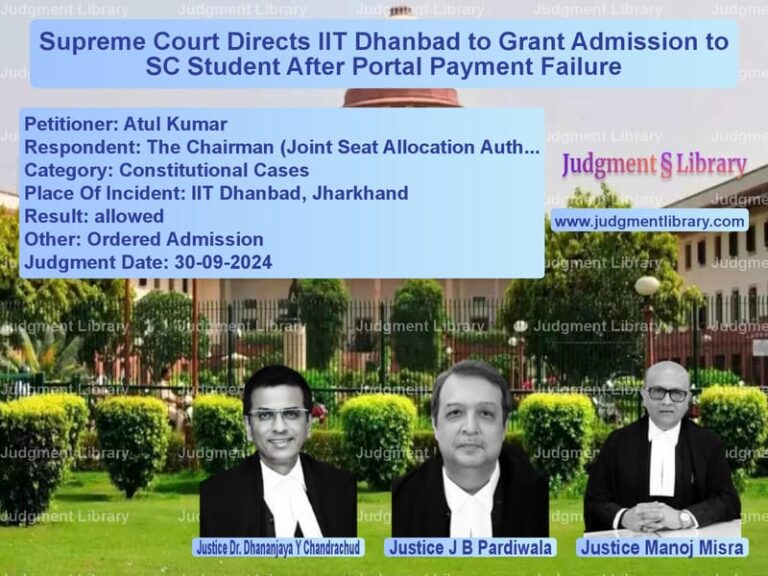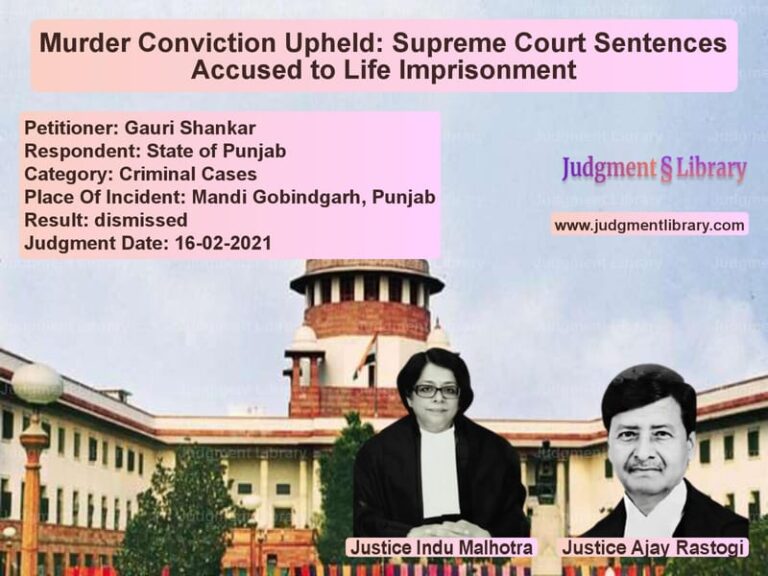Supreme Court Upholds Conviction in Rape Case, Emphasizes Victim Identity Protection
The Supreme Court of India, in Lalit Yadav vs. The State of Chhattisgarh, upheld the conviction of the appellant under Sections 376 and 342 of the Indian Penal Code (IPC), dismissing his appeal. This case underscores the judiciary’s strict stance on sexual offenses while reinforcing the significance of protecting the victim’s identity as mandated by Section 228-A IPC.
Background of the Case
The appellant, Lalit Yadav, was convicted by the trial court for the offenses of rape and wrongful confinement. The prosecution’s case established that the accused had committed a heinous crime against the victim, leading to his conviction. The trial court sentenced him to:
- Seven years of rigorous imprisonment under Section 376 IPC.
- One year of imprisonment under Section 342 IPC for wrongful confinement.
Upon appeal, the Chhattisgarh High Court affirmed the conviction and sentence. Dissatisfied with the ruling, the appellant approached the Supreme Court, seeking relief from his conviction.
Petitioner’s Arguments
The appellant, Lalit Yadav, contended:
- The conviction was based on weak and unreliable evidence.
- There were inconsistencies in the victim’s testimony, which raised doubts about the prosecution’s case.
- The sentence imposed was too harsh, considering the circumstances.
- The prosecution had failed to prove the charges beyond a reasonable doubt.
Respondent’s Arguments
The State of Chhattisgarh argued:
- The victim’s testimony was credible and consistent with medical evidence.
- The prosecution had established the accused’s guilt beyond a reasonable doubt.
- The trial court and the High Court had correctly appreciated the evidence, leaving no ground for interference by the Supreme Court.
- The conviction was based on sound legal reasoning and did not warrant reconsideration.
Supreme Court’s Observations
The Supreme Court carefully examined the evidence and the procedural fairness of the trial. It dismissed the appeal, holding that:
“We do not see any reason to upset the orders of conviction and sentence, and as such, this petition stands dismissed.”
However, the Court noted a serious procedural lapse regarding the victim’s identity. It observed:
“We, however, notice from the judgments of both, the trial court and the High Court, that the victim in the present case who was examined as PW2 has been named all through. Such a course is not consistent with Section 228-A of IPC.”
The Court referenced its previous ruling in State of Punjab v. Ramdev Singh (2004) 1 SCC 421, where it had underscored the necessity of safeguarding the victim’s identity in sexual offense cases.
Legal Principles Established
The judgment reinforced several critical legal principles:
- Protection of Victim’s Identity: Courts must ensure that judgments in sexual offense cases do not disclose the victim’s name to prevent further distress.
- Credibility of Victim’s Testimony: The testimony of a victim in a rape case must be given due weight unless there are compelling reasons to disbelieve it.
- Limited Scope for Interference: Appellate courts should not interfere with concurrent findings of fact unless there is a manifest error.
- Strict Punishment for Sexual Offenses: Courts must impose stringent penalties in rape cases to deter potential offenders.
Final Judgment and Directives
The Supreme Court ruled:
- The appeal was dismissed, affirming the conviction and sentence of the appellant.
- The High Court’s registry was directed to place the case record before the concerned judge to rectify the mention of the victim’s name in court documents.
- The High Court was further instructed to issue appropriate practice directions to trial courts to ensure compliance with Section 228-A IPC.
Implications of the Judgment
The ruling has far-reaching implications for legal proceedings in sexual offense cases:
- Precedent for Future Cases: The judgment sets a benchmark for courts to uphold stringent punishment in sexual offenses while ensuring due process.
- Compliance with Section 228-A IPC: The directive to avoid disclosure of the victim’s identity is a crucial reminder to lower courts to exercise caution in drafting judgments.
- Judicial Sensitivity: The ruling underscores the need for judicial sensitivity when handling rape cases, ensuring victims are not further traumatized.
- Reaffirmation of Legal Protection: The Supreme Court’s reaffirmation of the victim’s rights strengthens India’s legal framework for sexual offense cases.
Conclusion
The Supreme Court’s decision in Lalit Yadav vs. The State of Chhattisgarh upholds the principles of justice, emphasizing the need for strict punishment in rape cases while ensuring the protection of victims’ identities. The ruling serves as a guiding precedent for courts to maintain confidentiality in sexual offense trials and ensure that justice is delivered in a fair and sensitive manner.
Petitioner Name: Lalit Yadav.Respondent Name: The State of Chhattisgarh.Judgment By: Justice Abhay Manohar Sapre, Justice Uday Umesh Lalit.Place Of Incident: Chhattisgarh, India.Judgment Date: 05-07-2018.
Don’t miss out on the full details! Download the complete judgment in PDF format below and gain valuable insights instantly!
Download Judgment: Lalit Yadav vs The State of Chhatti Supreme Court of India Judgment Dated 05-07-2018.pdf
Direct Downlaod Judgment: Direct downlaod this Judgment
See all petitions in Rape Cases
See all petitions in SC/ST Act Case
See all petitions in Bail and Anticipatory Bail
See all petitions in Judgment by Abhay Manohar Sapre
See all petitions in Judgment by Uday Umesh Lalit
See all petitions in dismissed
See all petitions in supreme court of India judgments July 2018
See all petitions in 2018 judgments
See all posts in Criminal Cases Category
See all allowed petitions in Criminal Cases Category
See all Dismissed petitions in Criminal Cases Category
See all partially allowed petitions in Criminal Cases Category







